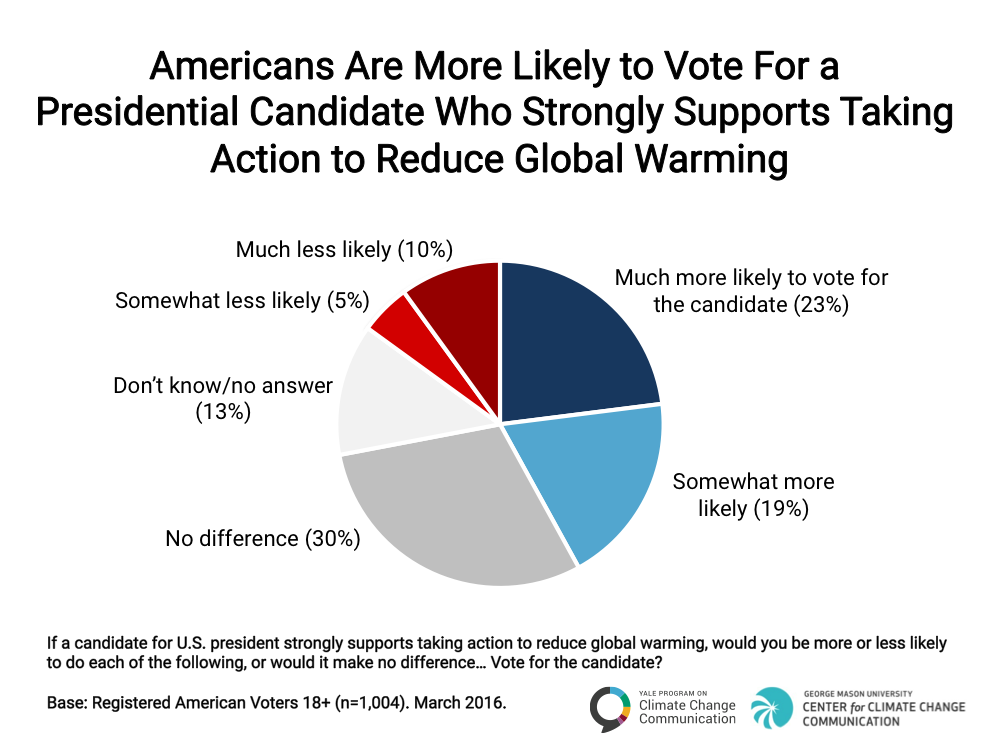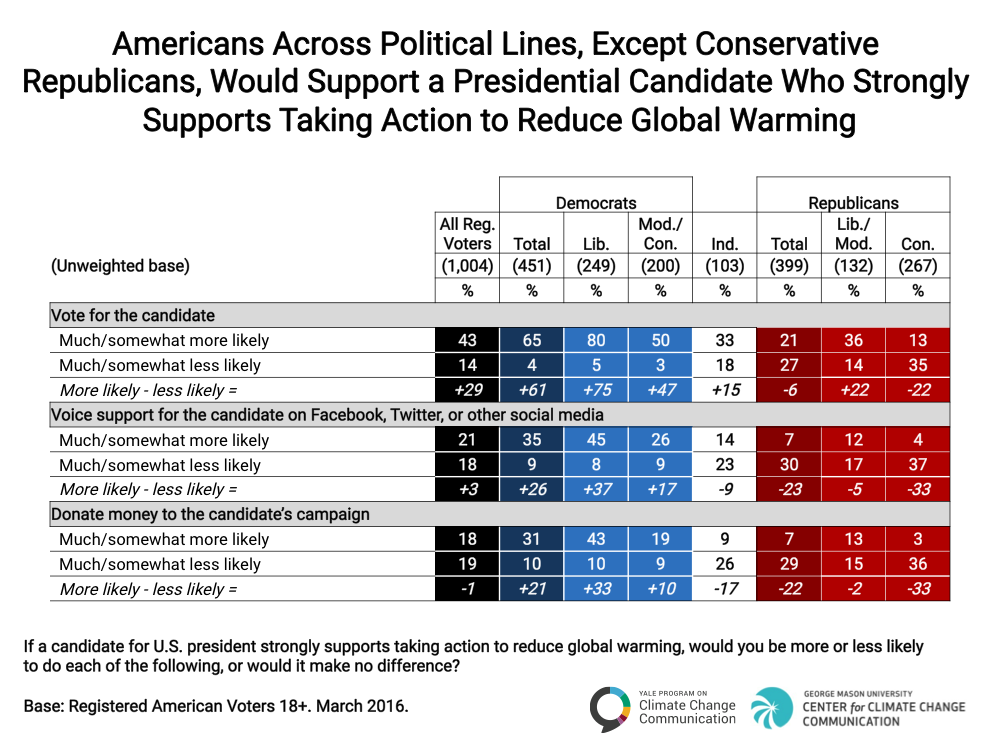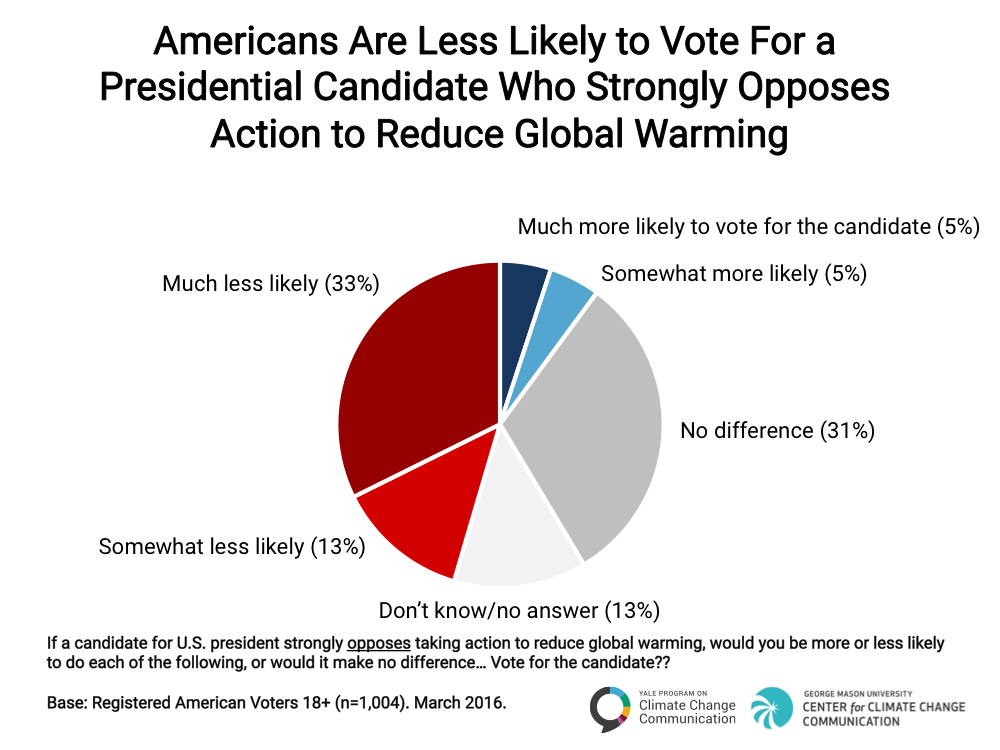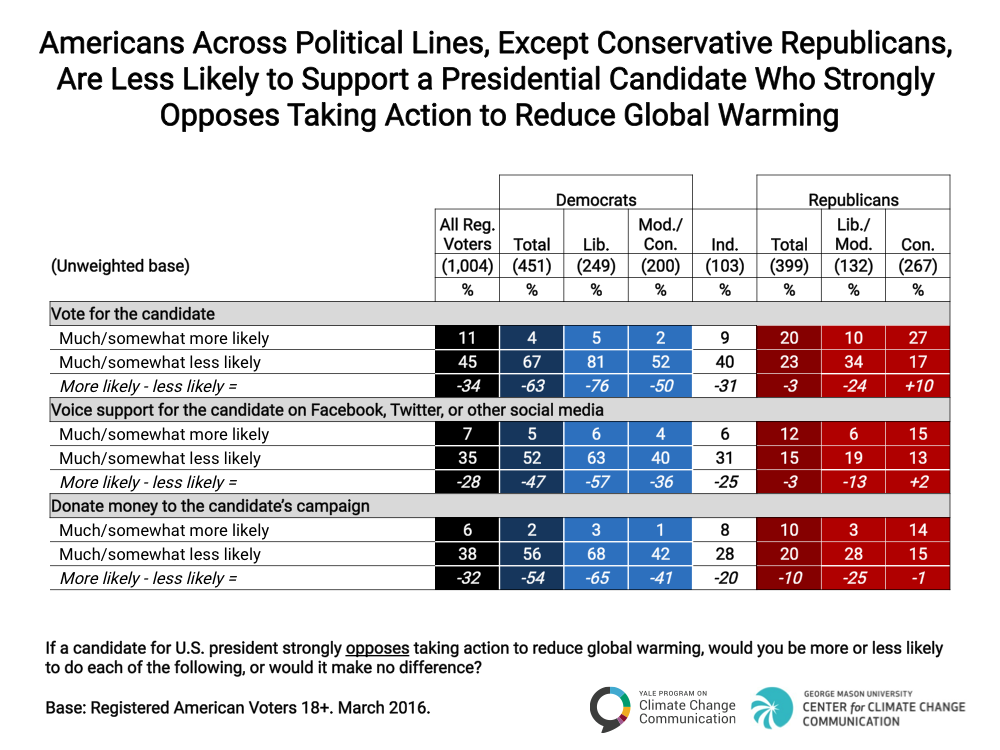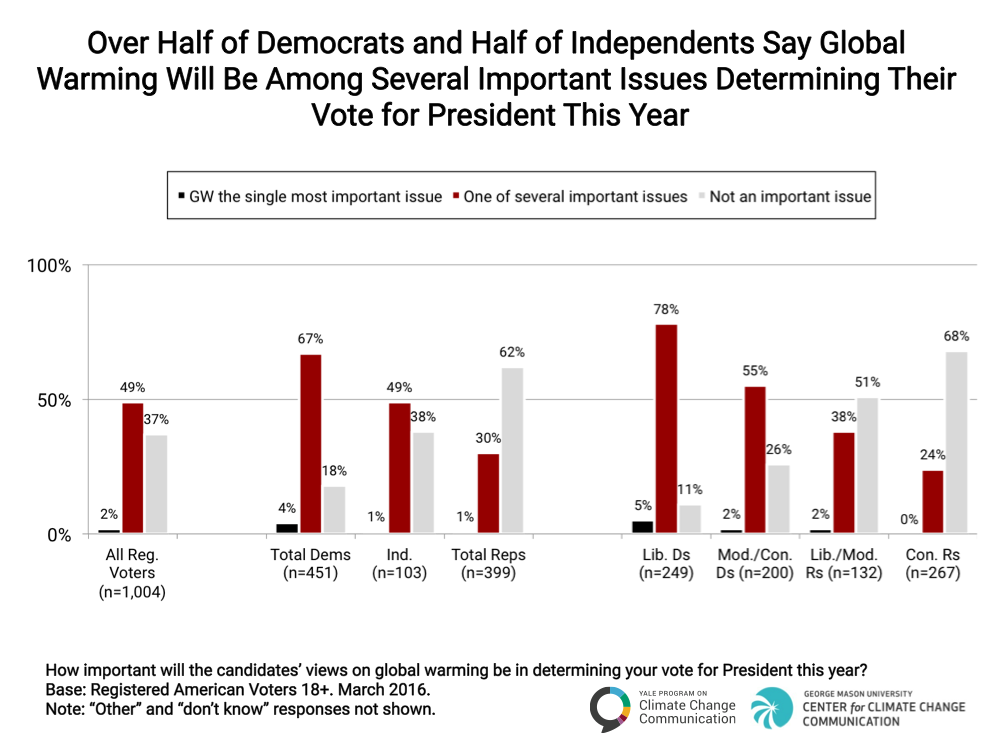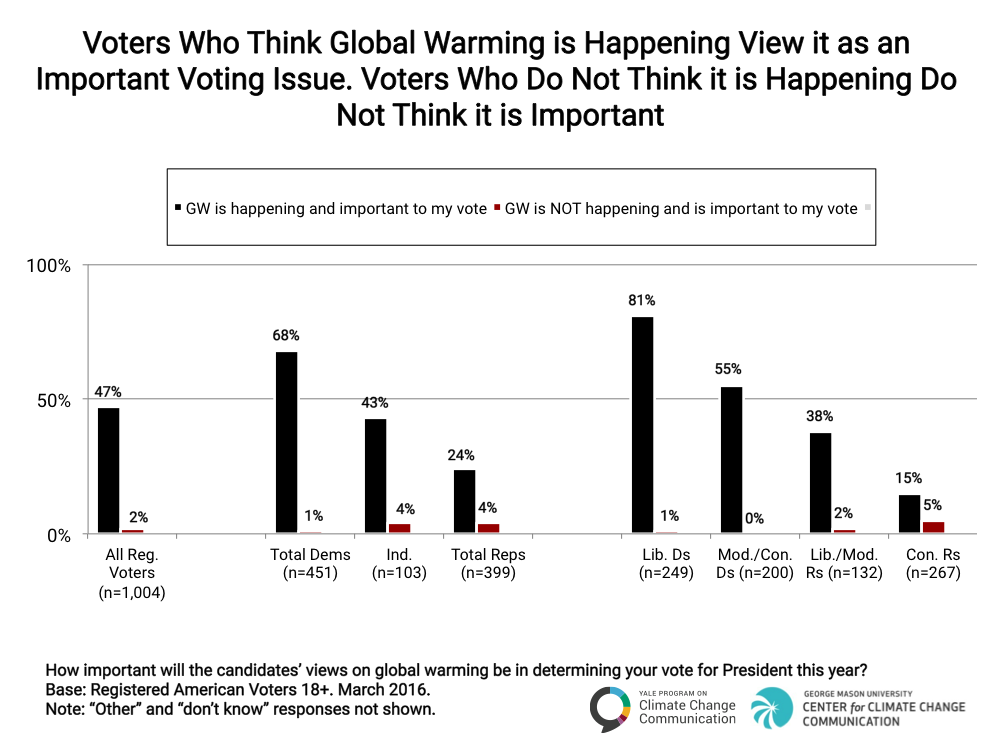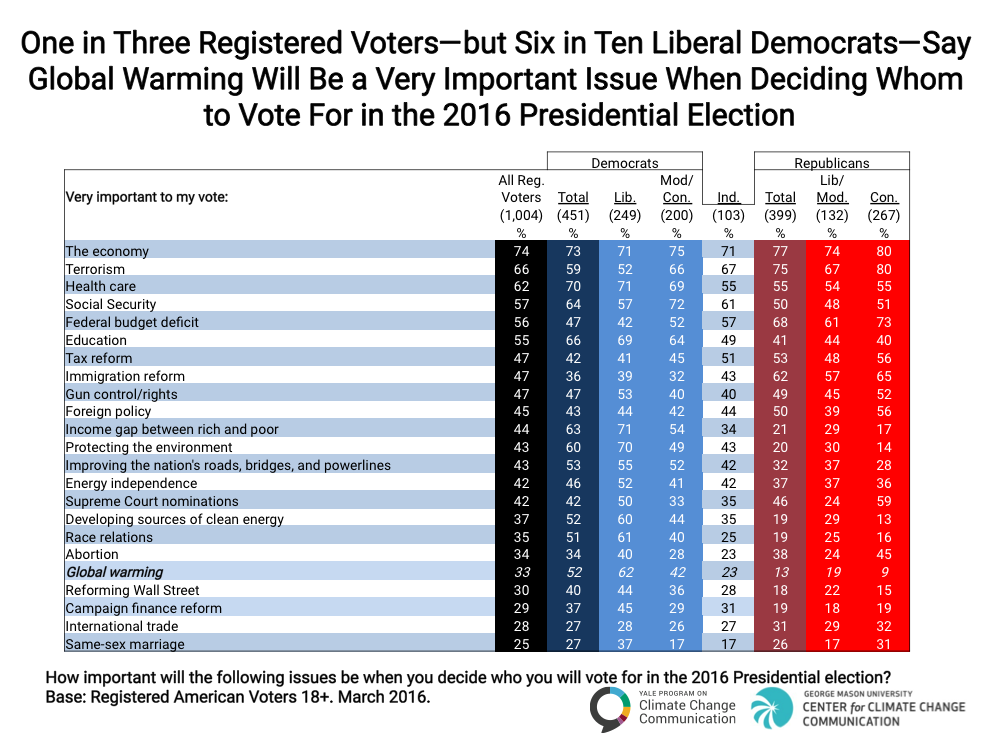Report · Apr 25, 2016
Politics and Global Warming, Spring 2016
By Anthony Leiserowitz, Edward Maibach, Connie Roser-Renouf, Geoff Feinberg and Seth Rosenthal
Filed under: Policy & Politics
2. Global Warming as an Issue in the November 2016 Elections
2.1. Americans are more likely to vote for a presidential candidate who strongly supports taking action to reduce global warming.
Americans are more likely to vote for a presidential candidate who strongly supports taking action to reduce global warming. Asked if they would be more or less likely to vote for a presidential candidate who strongly supports action to reduce global warming, or if it would make no difference, registered voters are three times as likely to say they would be more (43%, up 7 points since October, 2015) rather than less likely (14%) to vote for such a candidate.
On balance, Democrats say they are much more likely than less likely to vote for a presidential candidate who strongly supports taking action to reduce global warming (+61 percentage points), which rises to +75 points among liberal Democrats. Likewise, Independents are +15 points and liberal and moderate Republicans are +22 points more likely to vote for such a candidate. Conservative Republicans, however, say they are less likely to vote for such a candidate (-22 points).
Democrats are more likely to voice support on social media for a candidate who supports taking action to reduce global warming (+26 points). Republicans, conversely, are less likely to voice support on social media (-23 points).
Democrats are more likely to donate money to the campaign of a presidential candidate who supports climate action (+21 points), but Independents and Republicans are less likely to (-17 and -22 points, respectively).
2.2. Americans are less likely to vote for a presidential candidate who strongly opposes taking action to reduce global warming.
Conversely, Americans are less likely to vote for a presidential candidate who strongly opposes taking action to reduce global warming. Asked if they would be more or less willing to vote for a presidential candidate who strongly opposes action to reduce global warming, registered voters are about four times more likely to vote against such a candidate, than to vote for them (45% vs. 11%, respectively).
Democrats, Independents and liberal/moderate Republicans are much less likely to vote for a candidate who opposes climate action (-63, -31, and -24 percentage points respectively). Conservative Republicans, on balance, say they are more likely to vote for such a candidate (+10 percentage points).
This asymmetry indicates that presidential candidates who wish to appeal to Democrats, Independents and liberal/moderate Republicans should support climate action. Those who wish to appeal to conservative Republicans should oppose climate action, but will likely pay a political price for this stance with all other groups.
Democrats, Independents and liberal/moderate Republicans are less likely to voice support on social media (-47, -25, and -13 percentage points, respectively) or donate money to the campaign of a candidate who opposes climate action (-54, -20, and -10 points, respectively).
2.3. Over half of Democrats and half of Independents say global warming will be among several important issues in determining their vote for president this year.
Over half of Democrats (67%; 78% of liberals and 55% of moderates/conservatives) and half of Independents (49%) say global warming will be among several important issues they consider when determining their vote for president this year.
Very few Americans of any political affiliation say it will be the most important issue. A majority of Republicans say it will not be an important issue.
Analyzed another way, there are a large number of registered voters who think global warming is happening and say the issue is important to their vote. By contrast, there are very few voters who think global warming is not happening and say the issue is important to their vote.
2.4. One in three registered voters—but six in ten liberal Democrats—say global warming will be a very important issue when deciding whom to vote for in the 2016 presidential election.
Compared to most other issues discussed by the presidential candidates, global warming is one that fewer than half of registered voters say will be very important to their vote. Liberal Democrats are the clear exception: six in ten (62%) say global warming will be a very important issue influencing their vote in 2016.
Among the issues voters say will influence their vote for President in 2016, global warming ranked 19th in importance of the 23 issues asked about. However, it was the tenth most important issue to Democrats (sixth highest for liberal Democrats and 13th highest for moderate/conservative Democrats). By contrast, global warming was near or at the bottom of presidential voting priorities for Independents and Republicans.
